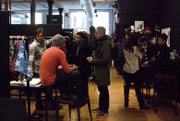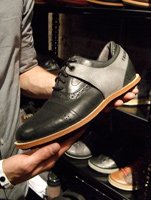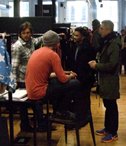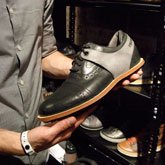Project Trade Show Returns to New York With New Format
NEW YORK—After taking a hiatus last season, the Project show returned to New York with a retooled format in a loft-like space in New York’s SoHo district.
The show featured a mix of contemporary menswear brands, including apparel, accessories and footwear.
“This is a well-curated show,” said Jason Bates, owner of the Derelicte showrooms in Los Angeles and New York. “It reminds me of Project’s roots in the very beginning.”
Bates was showing three of his brands—Neuw denim, British label Farah and Cheddar Pocket accessories.
“For Farah and Neuw, we’ve gotten eight or nine new accounts, and for Cheddar Pocket, five new—and they’re people we don’t usually see in the showroom,” Bates said on the first day.
David Lim, designer of Los Angeles–based Kasil Jeans, also praised the look of the show.
“It’s more focused, more boutique,” he said, adding that he’d seen several existing accounts on the first day of the show. “People are hoping for a better year in 2011,” he said. “We all have to be optimistic.”
In addition to Kasil’s core denim collection, Lim was showing some new looks and developments, including a tailored denim blazer lined in gingham and a wrinkle wash to give jeans a worn look.
To address the rising cotton prices, Kasil introduced a few new fabrications, including Tencel blends and wool.
Lim said he worked to perfect the look and feel of Kasil’s cotton/wool jeans, which have a soft hand and will not shrink like traditional wool.
“We did a lot of testing,” he said. “We washed the fabric first, then it was sewn and washed again. There’s a lot of new wash techniques out there.”
This was the first New York show for San Clemente, Calif.–based Ambsn, according to co-owner Dustin Odbert, who said he landed orders from a new store in Boston and a few core accounts on the first day.
Ambsn has been adding more contemporary pieces to the collection—and wanted to show at Project to add more high-end stores and East Coast accounts, Odbert said. Still, the brightly colored collection stayed true to its West Coast sensibilities.
“There’s a good mix of brands here, and everything is black—we’re like a flashlight,” Odbert said. “ Retailers are looking for a different look, which makes it nice for us. They feel like we’re a breath of fresh air.”
Los Angeles–based Copy had back-to-back appointments the afternoon of the first day, said company President Murphy Martines.
Buyers were looking for “anything in different silhouettes than typical,” Martines said. Copy was showing its “Slimfit” suit, which is priced to sell below $500 at retail.
Copy was one of four collections represented by 722 Figueroa at Project. The Los Angeles showroom was also showing three of its collections at Capsule.
San Francisco–based footwear collection Tsubo (another 722 Figueroa line) was at Project to unveil its new focus, said Gianpaolo Altomari, whose business card describes him as Tsubo’s “brain stormer.”
“A lot of people know Tsubo Sport,” he said. “It’s a very technically based company. This is the resurgence of the line. It has evolved into a fashion line for the consumer who is moving away from sneakers but is not ready for a dress shoe.”
Using construction techniques typically used for sneakers, Tsubo’s men’s and women’s shoes and boots feature fashionable styling and unusual details.
The company is currently working with guest designers to launch a new premium line this spring.
Los Angeles–based footwear brand Royal Elastics was also at Project to debut a new look and direction for the company, which split with parent company K-Swiss in 2009. Last year, the company launched a small men’s and women’s apparel line but introduced a full collection for Spring 2011. Produced in China, the apparel sells at retail for $24 to $120 and features fleece and hoodies, as well as more-tailored jackets, vests and bottoms.
“We’re going after department stores that sell lifestyle fashions; we have a lot of independents, and we’re getting more interest from the retail chains,” said Sean Harrell, director of sales for North America. “We chose Project because we knew they were coming back [to New York] and that it would be more boutique.”
Overall, exhibitors at Project reported upbeat retailers shopping the show. “Retailers have been in a better mood—holiday didn’t suck,” said Ambsn’s Odbert.—Alison A. Nieder

























